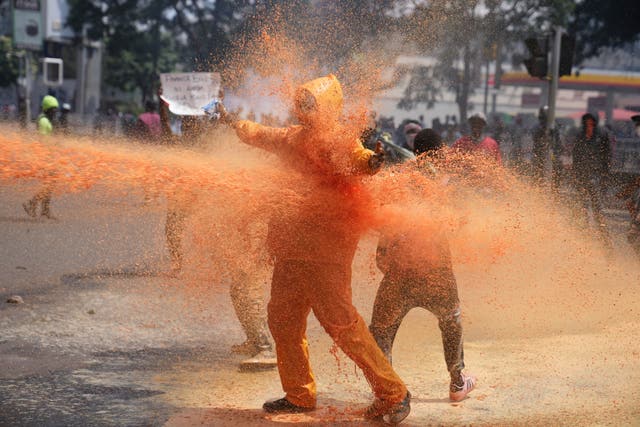Police clash with protesters in Kenya as military patrols the streets
On Tuesday thousands of protesters stormed Kenya’s parliament, burning parts of the building.

Kenyan police on Thursday clashed with protesters in Nairobi ahead of planned protests against a controversial finance Bill, despite the president’s decision not to sign it after the plans sparked deadly chaos in Nairobi and saw protesters storming and burning part of the parliament building.
Protesters who said last week that they would march to the State House on Thursday say they still do not trust President William Ruto, who has said the tax hikes would be withdrawn and budget cuts would be made.
Police have hurled tear gas canisters at groups of protesters attempting to congregate within the central business district. The military has been patrolling the city despite a court order that suspended their deployment to support police during the protests.
Deputy president Rigathi Gachagua on Wednesday urged the young protesters to call off planned protests and give dialogue a chance.
The leaderless movement began online with young people demanding that legislators reject the proposed tax hikes. It later morphed into calls for the president’s resignation after the Bill was passed.

On Tuesday thousands of protesters stormed Kenya’s parliament, burning parts of the building and sending politicians fleeing. Police opened fire and at least 22 people were reportedly killed in the chaos.
Activists were divided about the agenda of Thursday’s protests. One protester, Boniface Mwangi, urged others to peacefully march to a road where protesters were killed to pay their respects.
“Invasion of the State House isn’t a solution,” he wrote on X.
But Francis Gaitho, one of the many activists mobilising for the protests online, insisted that young people should march to the State House.

Activists and others warned the stakes were higher than in past protests because Mr Ruto vowed on Tuesday to quash unrest “at whatever cost”.
Analyst Javas Bigambo told the Associated Press that the discontent is partly because Kenyans do not trust the president to implement the austerity measures he announced on Wednesday.
“Kenyans still have a problem with the economy and wastage in government,” he said.
Businesspeople in Nairobi were standing guard outside their shops on Thursday to prevent looting and vandalism, which took place during Tuesday’s protests.
Major roads leading to key government buildings, including parliament, have been blocked.
Outside Nairobi, protests have been reported in Mombasa, Kisumu, Migori and other major towns.
US secretary of state Antony Blinken spoke to Mr Ruto on Wednesday, thanking him for taking steps to reduce tensions.
“The secretary underscored the importance of security forces demonstrating restraint and refraining from violence and encouraged prompt investigations into allegations of human rights abuses,” a statement read.

Mr Ruto has been embraced by the US as a welcome, stable partner in Africa while frustration grows elsewhere on the continent with the US and some other western powers.
In May, Mr Ruto went to Washington in the first state visit by an African leader in 16 years.
On Tuesday, as the protests erupted, the US designated Kenya as its first major non-Nato ally in sub-Saharan Africa, a largely symbolic act but one highlighting their security partnership.
Also on Tuesday, hundreds of Kenyan police deployed to lead a multinational force against gangs in Haiti, an initiative that brought thanks from US President Joe Biden.
Parliament Speaker Moses Wetangula on Thursday referred the president’s memorandum on the finance Bill to the finance committee, which is expected to report back to the house in the next sitting. Parliament is on recess until July 23.





